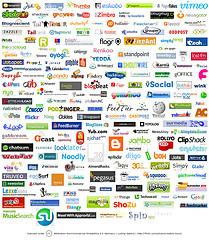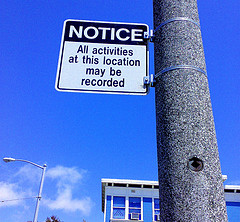So, this has been doing the rounds since its release at SDCC (which – given by what I’ve seen of it from blogs, Twitter and elsewhere – is less a convention and more some sort of fundamental rupture of reality that lets a million weird facets of pop culture manifest in the material world for a weekend); my first spot of it was at SF Signal, so they get the hat-tip. It’s the trailer for a forthcoming web-native series called H+…
And here’s the blurb for those of you who can’t or won’t watch videos:
H+: The Digital Series takes viewers on a journey into an apocalyptic future where technology has begun to spiral out of control…a future where 33% of the world’s population has retired its cell phones and laptops in favor of a stunning new device – an implanted computer system called H+.
This tiny tool allows the user’s own mind and nervous system to be connected to the Internet 24 hours a day. But something else is coming… something dark and vicious… and within seconds, billions of people will be dead… opening the door to radical changes in the political and social landscape of the planet — prompting survivors to make sense of what went wrong.
Hmmm. So, what can we take from this? First off, “H+” or human augmentation as a cultural meme is strong enough on the geek fringes that someone thinks it’s a marketable theme for popular drama; this in itself is a very interesting development from the perspective of someone who chronicles and observes the transhumanist movement(s), because it’s a sign that traditionally science fictional or cyberpunkish ideas are being presented as both plausible and imminent*. Meme’s gonna go mainstream, yo.
Secondly, and less surprisingly, the underlying premise appears to be The Hubris Of Technology Will All But Annihilate Our Species, with a sideserving/undercurrent of Moral Panic. Handwringing over the potentially corrosive-to-civilisation properties of social media is common currency (as regular readers will be only too aware already), which means the soil is well-tilled for the seed of Singer’s series; it’s a contemporary twist on the age-old apocalypse riff, and that never gets old. Too early to tell whether the Hairshirt Back-To-The-Earth philosophy is going to be used as solution paradigm, but I’d be willing to put money on it making a significant showing. This is disappointing, but inevitable; as Kyle Munkittrick points out in his brief overview of the new Captain America movie, comics and Hollywood default to the portrayal of human augmentation as either an accident born of scientific hubris or the tainted product of a Frankensteinian corporation:
In what seems like every other superhero origin story, powers are acquired through scientific hubris. Be it the unintended consequences of splitting the atom, tinkering with genetics, or trying to access some heretofore unknown dimension, comic book heroes invariably arise by accident.
[…]
Normally, those who seek superpowers are unworthy because they believe they deserve to be better than others, thus, the experiments go wrong.
Yeah, that’s about right. And the choice of series title is very fortuitous; the avalanche of early responses drawing analogies to Google+ has probably already started on the basis of that trailer alone, which is going to annoy me just as much as Googlephobia does. I’ve been rereading Marshall McLuhan lately (in part so I could write a piece for his 100th birthday at Wired UK), and was struck by how calmly and persistently he insisted that making moral judgements of technologies was futile; indeed, he took the position that by spending less effort on judging our technologies, we might clear the moral fog that exists around our actual lives. In McLuhan’s thought, media are extensions of ourselves into time and space; it seems to me that the biggest problem they cause isn’t a moral degradation of humanity, but the provision of a convenient proxy to blame our human problems on: it woz the intertubes wot dun it.
There is an inevitability to the technological moral panic as popular narrative, though, and that’s underlined by its admirable persistence over time – as TechDirt‘s Mike Masnick reminds us, they’re at least as old as Gutenburg’s printing press (and we’re still here, as yet untoppled by our technological revolutions). Masnick also links to a WSJ blog piece that bounces off the research of one Genevieve Bell, director of Intel Corporation’s Interaction and Experience Research, who reiterates the persistence of the technological moral panic over time, and points out that it tends to locate itself in the bodies of women and children:
There was, she says, an initial pushback about electrifying homes in the U.S.: “If you electrify homes you will make women and children and vulnerable. Predators will be able to tell if they are home because the light will be on, and you will be able to see them. So electricity is going to make women vulnerable. Oh and children will be visible too and it will be predators, who seem to be lurking everywhere, who will attack.
“There was some wonderful stuff about [railway trains] too in the U.S., that women’s bodies were not designed to go at 50 miles an hour. Our uteruses would fly out of our bodies as they were accelerated to that speed.”
She has a sort of work-in-progress theory to work out which technologies will trigger panic, and which will not.
- It has to change your relationship to time.
- It has to change your relationship to space.
- It has to change your relationship to other people.
And, says Ms. Bell, it has to hit all three, or at least have the potential to hit them.
Interesting stuff, including a riff on comedy as a feedback loop in culture that enables us to control and mitigate the boundaries of what is acceptable with a new technology or medium. But as Bell points out, the march of technological change won’t wait for us to catch up with it; this state of technological angst has persisted for centuries, and will likely persist for as long as we remain a technologised species. Which means the doomsayers (and doomsayer media like H+) ain’t going anywhere… but going on past form, I’m going to assume we’ll find a way to ride it out and roll with the punches.
And just in case you were expecting a more standard blogger response to a television series trailer: yeah, I’ll probably watch H+, at least for long enough to see if it’s a good story well told; it looks like it might well be, regardless of the source of the narrative hook.
What about you?
[ * Which isn’t to say that the plot device in H+ will necessarily be scientifically plausible as it gets presented. Indeed, I rather suspect there’ll be some Unified Quantum Handwave Theory and/or Unobtainium involved… but the portrayal of social media as an internalised technology in the human body within a contemporary fictional milieu? That’s something I’ve not seen anywhere other than text media (books, stories, comics) thus far. ]
 Seeing as how I ended up with a whole bunch of related links, I thought they might as well all fit in one post. So, your overarching thematic question is: the power of the web and social media is pretty much a given, but does it empower us in ways that are beneficial or detrimental?* [image by
Seeing as how I ended up with a whole bunch of related links, I thought they might as well all fit in one post. So, your overarching thematic question is: the power of the web and social media is pretty much a given, but does it empower us in ways that are beneficial or detrimental?* [image by 

 The Chinese government is backpedalling with all the terse dignity it can muster;
The Chinese government is backpedalling with all the terse dignity it can muster;